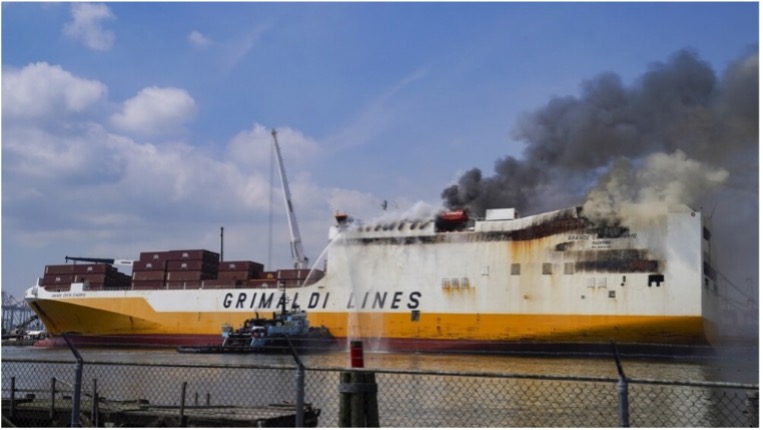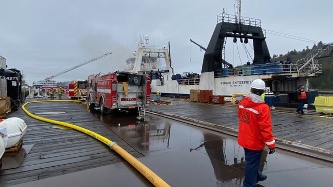In-Port Marine Casualties are Marine Casualties

By Dennis L. Bryant
A casualty on a vessel tied up at a pier, dock, or wharf is still a marine casualty and the master/owner/operator must still notify the U,S. Coast Guard. If the vessel falls within the purview of the Oil Pollution Act of 1990 (OPA 90), the Qualified Individual (QI) must also be consulted and the vessel response plan (VRP) possibly activated. Notifying the local fire department is prudent and possibly necessary, but it doesn’t override the federal requirements.
Failure to timely notify the Coast Guard and to notify the QI (and activate the VRP) can have serious consequences.
On June 4, 2020, a fire broke out on the roll-on/roll-off cargo vessel Hoegh Xiamen, at the pier in the Port of Jacksonville, Florida. While the crew attempted to fight the fire, the master attempted to call the ship’s agent by mobile phone but could not reach the agent. He then unsuccessfully tried to reach the non-existent “Jacksonville Port Control” by VHF radio. Later, the Coast Guard called the ship via VHF channel 14. The master reported the fire and requested assistance, but then left the bridge without giving the ship’s position. Soon thereafter, a passerby observed the smoke and called 911, which alerted to local fire department. At about the same time, a passing vessel observed the smoke and notified the Coast Guard. None of the ship’s crew were injured, but nine of the shoreside firefighters responding to the incident were injured during firefighting efforts. The vessel and its cargo were declared a total loss. The ship had an approved VRP, but at no relevant time was the ship’s QI notified of the casualty, and the VRP was never activated, so the contracted salvage and marine firefighting resources never responded.
On July 5, 2023, a fire broke out on the roll-on/roll-off cargo vessel Grande Costa d’Avorio at the pier in Port Newark, New Jersey. The casualty investigations remain incomplete, so there are various unknowns. What we do know is that two shoreside firefighters died and several others were injured. The local fire department had little or no maritime firefighting training, experience, or familiarization with cargo vessels of any type. Vessel fires require more firefighting resources and different technical skills than many land based firefighting agencies traditionally possess. The vessel had an approved VRP, but it is unclear if the ship’s QI was notified of the casualty.
As the Coast Guard noted, these are two of several vessel fires in the past five years where the lack of familiarity with commercial vessels and inexperience with shipboard firefighting techniques has unduly endangered the safety of responding personnel.
It bears repeating that a marine casualty in port is still a marine casualty. While notifying the local fire department is prudent, applicable laws and regulations require the master/owner/operator to immediately notify the Coast Guard and the ship’s QI and for the VRP to be activated. The VRP includes contact details for the ship’s contracted salvage and marine firefighting (SMFF) resource provider. That resource provider has the trained personnel and specialized equipment to effectively respond.

